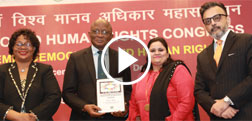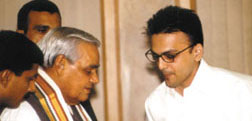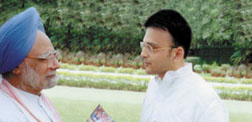Information Centre
Categories
Examinations
Statement of VIPs
Address by the Hon’ble President of India Smt Droupadi Murmu on the occasion of Human Rights Day |
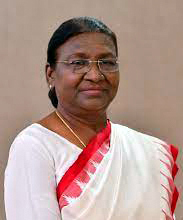
New Delhi, 10th December 2024. I am happy to be here with you all on the occasion of Human Rights Day – a day of profound significance for humanity. On this occasion, I extend my heartfelt appreciation to the fellow citizens whose belief in equality, justice, liberty and fraternity is the cornerstone of our democratic ethos. It is a day to remember the institutions that strive to protect and promote the rights of the most vulnerable sections of society. The National Human Rights Commission, the State Human Rights Commissions, various other Commissions, the judiciary, and other key stakeholders have worked tirelessly to be the voice of the voiceless. I compliment them for their steadfast commitment and untiring work towards ensuring human rights for all. Today, as we reflect on the ideals enshrined in the Universal Declaration of Human Rights adopted on this day in 1948, we reaffirm our collective resolve to contribute to building a world where justice and human dignity are the bedrock of society. India today stands as a shining example where great initiatives are being taken by the government for poverty alleviation, eradication of hunger by providing free food to underprivileged and offering equal opportunities to youth to realise their dreams. India, with its civilisational heritage spanning over 5,000 years, has long upheld values of empathy, compassion, and the inter- connectedness of individuals within a harmonious community. Based on these values, institutions such as the NHRC and SHRCs along with civil society, human rights defenders, special rapporteurs and special monitors, have been working to ensure the protection of human rights for all. I commend the proactive role played by the NHRC in addressing violations, raising awareness and recommending policy changes to uphold the rights of the marginalised. It also gives me immense pleasure to receive the first copies of three significant publications: Nayi Dishayein, the NHRC English Journal, and a compendium of its Advisories. These publications reflect the Commission’s dedication to advancing human rights discourse and fostering greater awareness. Thank You, Jai Hind! |
Message of President of The United States of America Mr. Joe Biden on the occasion of Human Rights day 10th December 2021 |
|
In the wake of the devastation of the Second World War, leaders from around the world came together with a shared vision to promote a safer future for all nations by securing and advancing the human rights of everyone, everywhere. On December 10, 1948, thanks to the moral leadership and service of Eleanor Roosevelt as the first Chairperson of the Commission on Human Rights, the world took an enormous step forward with the creation of the Universal Declaration of Human Rights (UDHR). The UDHR enshrines the human rights and fundamental freedoms inherent in all people — no matter who they are, where they come from, or whom they love. It is a foundational document that proclaims a truth too often overlooked or ignored — that “all human beings are born free and equal in dignity and rights.” From the root of this universal ideal has sprung transformational human rights treaties and a global commitment to advance equality and dignity for all as the foundation of freedom, peace, and justice. As a world, we have yet to achieve this goal, and we must continue our efforts to bend the arc of history closer to justice and the shared values that the UDHR enshrines. Just as we advocated for the recognition of universal human rights following World War II, the United States today remains steadfast in our commitment to advancing the human rights of all people — and to leading not by the example of our power but by the power of our example. Since taking office, my Administration has put human rights at the center of our domestic and foreign policy priorities. We immediately declared our intention to rejoin the United Nations Human Rights Council, and with the widespread support of the international community, our Nation was elected to a new term beginning on January 1, 2022. As a member of the Council, we will highlight the vital importance of democracy as we work to protect human rights and hold accountable those who would violate these rights and freedoms. We will continue to call out human rights violations wherever they occur, support brave activists on the front lines of protecting fundamental freedoms, and invest in strengthening the rule of law. As a global champion for democracy, we must also continue the unceasing work of strengthening our own democracy and building a more perfect union. Leading by example is one of the most powerful and persuasive foreign policy tools at our disposal. From day one of my Administration, we have taken concrete steps to reassert our moral leadership on the global stage. On my first day in office, I signed an Executive Order to advance racial equity and support for underserved communities. As part of our once-in-a-generation investment in our Nation’s physical infrastructure, we are also strengthening equitable access to our shared resources and environment, including providing additional support for historically underserved communities. Unfortunately, discrimination and violence are challenges that too many Americans still face in their own communities. Throughout our Nation’s history, generations of Black and Brown Americans, Indigenous persons, people with disabilities, LGBTQ+ Americans, immigrants, women and girls, and members of religious, ethnic, and other historically marginalized groups have faced heightened threats to their human rights and dignity. Today, we know that our efforts to defend human rights around the world are stronger because we acknowledge and seek to remedy our own historical challenges as part of that same fight. Leading by example means speaking honestly about the past, upholding the truth, and striving constantly to improve. This year, as we commemorate Human Rights Day, my Administration will bring together global leaders, civil society organizations, and representatives from the private sector for the first Summit for Democracy. Working together, we will recommit ourselves to promoting respect for human rights and combating growing threats to democracy, including authoritarianism and corruption. We will speak honestly about the challenges we face, and we will identify meaningful new actions and commitments to advance our shared goals. I call upon all Americans to keep the words of the Reverend Dr. Martin Luther King, Jr. in their hearts: “injustice anywhere is a threat to justice everywhere.” Let us all dedicate ourselves to bringing our Nation and our world closer to a future in which every human being is free to pursue their highest dreams and unleash their full potential. NOW, THEREFORE, I, JOSEPH R. BIDEN JR., President of the United States of America, by virtue of the authority vested in me by the Constitution and the laws of the United States, do hereby proclaim December 10, 2021, as Human Rights Day and the week beginning December 10, 2021, as Human Rights Week. I call upon the people of the United States to mark these observances with appropriate ceremonies and activities. IN WITNESS WHEREOF, I have hereunto set my hand this ninth day of December, in the year of our Lord two thousand twenty-one, and of the Independence of the United States of America the two hundred and forty-sixth. |
United Nations Secretary-General António Guterres message on Human Rights Day, 10 December 2024. |
|
On Human Rights Day, we face a harsh truth. Human rights are under assault. Tens of millions of people are mired in poverty, hunger, poor health and education systems that have not yet fully recovered from the COVID-19 pandemic. Global inequalities are running rampant. Conflicts are intensifying. International law is wilfully ignored. Authoritarianism is on the march while civic space is shrinking. Hateful rhetoric is fuelling discrimination, division, and outright violence. And women’s rights continue to be rolled back in law and practice. This year’s theme reminds us that human rights are about building the future — right now. All human rights are indivisible. Whether economic, social, civic, cultural or political, when one right is undermined, all rights are undermined. We must stand up for all rights — always. Healing divisions and building peace. Tackling the scourges of poverty and hunger. Ensuring health care and education for all. Advancing justice and equality for women, girls and minorities. Standing up for democracy, press freedoms and workers’ rights. Promoting the right to a safe, clean, healthy and sustainable environment. And defending human rights defenders as they carry out their vital work. The recently adopted Pact for the Future reinforced the world’s commitment to the Universal Declaration of Human Rights. On this important day, let’s protect, defend and uphold all human rights for all people. |
Volker Türk, United Nations High Commissioner for Human Rights, message on the eve of Human Rights Day, 10 December 2024 |
|
It is always good to see the UN Geneva Press Corps. I understand this year marks the 75th anniversary of the UN correspondents’ association in Geneva. I warmly congratulate you for your sustained reporting on human rights and humanitarian issues. More than ever, we need and the world needs quality journalism. Of course, I appreciate that the extraordinary events in Syria are very much on your minds, and I will come to that shortly. But let me start with Human Rights Day, which we mark tomorrow, at a time when human rights are not only violated, but also increasingly instrumentalized. As I look back at the year, I would like to highlight three key issues that continue to have massive ramifications for human rights around the world. Second, the blurring of lines between reality and fiction. In this mega-election year, we witnessed an increase in the politics of diversion and even gaslighting, and the dangerous proliferation of disinformation. And third, the focus on waging war and disinformation as a distraction from some of the biggest challenges to our long-term security – the triple planetary crisis of climate change, pollution, and biodiversity loss, as well as the huge inequalities in the world. The disregard for international law and apparent indifference to civilian lives and infrastructure have been starkly in focus in the conflict in Israel, the Occupied Palestinian Territory and Lebanon, as well as in Ukraine, Sudan and Myanmar, to name a few very stark examples. My Office has continued to report to the world, in detail, on the human suffering wrought in conflict. In Syria yesterday, we saw a regime driven from power following decades of brutal repression, and after nearly 14 years of relentless conflict. Hundreds of thousands of lives were lost during this time, more than 100,000 people disappeared, and some 14 million were driven from their homes, often in the most atrocious circumstances. I’ve met many of them over the years, witnessed their despair and trauma as they bore testimony to the most serious human rights violations committed against them, including torture and the use of chemical weapons. Yesterday, Syrians took to the streets with much hope and much anxiety for the future. Hope that this would be an opportunity for the country to build a future grounded in human rights, freedom and justice. And anxiety because so much is uncertain. Any political transition must ensure accountability for perpetrators of serious violations, and guarantee that those responsible are held to account. It is imperative that all evidence be collected and preserved meticulously for future use. Reform of the security apparatus will be key. This transition must also ensure that the tragedy of missing people is addressed. Hostilities are reportedly ongoing in some parts of Syria, including in the northeast. It is really important, imperative in fact, that all parties abide by their obligations under international humanitarian law and human rights law. All measures must be taken to ensure the protection of all minorities, and to avert reprisals and acts of revenge. The only way forward is a nationally owned political process that brings an end to the litany of suffering, fulfils the aspirations of all Syrians, and ensures truth, justice, reparation, healing and reconciliation. It is essential that the human rights of all Syrians are at the core of such a process, through meaningful and inclusive participation, including notably of women and young people. Syria’s sovereignty, unity, independence and territorial integrity must be restored. My Office is ready to support the transition process. This year has been marked by horrific numbers of people killed and severely injured in conflict, on and off the battlefield. Just this past weekend, at least 184 people were killed in violence orchestrated by the leader of a powerful gang in the Haitian capital of Port-au-Prince, in the Cité Soleil area. These latest killings bring the death toll just this year in Haiti to a staggering 5,000 people. We need to stem the flow of arms into Haiti, Sudan and Myanmar; to put on notice those providing arms, including to Israel and non-State armed actors in Lebanon, Syria, the Occupied Palestinian Territory, that international law requires States to exercise care that weapons they provide are not used to commit violations. We need to insist that it is not okay, and not legal, to use anti-personnel mines in Ukraine, it is not okay to provide them for use there, and it is not okay to reduce the threshold for the use of nuclear weapons. Instead, there should be an all-out effort by States to make it harder – not easier – to use such horrific weapons in the first place. I urge all States to refrain from taking any steps that could fuel conflict and lead to further escalation. The cost of war is so high. The human toll is incalculable. States need to do all in their power to insist that such senseless conflicts and suffering end. The world must turn away from the death spiral of militarized approaches to security, and find its way back to mediation, dialogue, negotiation and confidence-building. We need to stand in solidarity, and insist on the protection of the human rights of Syrians of all ethnic and religious groups, of Ukrainians and Russians affected by repression, for Palestinians and Israelis, for Sudanese, for the diverse peoples of Myanmar, for people on all sides. It is time for renewed activism, for overcoming divisions and forging alliances for peace-making. The viral spread of disinformation on social platforms and in some traditional media, including State-sponsored and State-funded disinformation campaigns, is sowing divisions and hatred, and discrediting human rights defenders, independent journalism and international institutions. People in leadership positions must stop the “othering” that dehumanizes entire communities, fuels hatred and violence, and feeds toxic ideologies and racism, including white supremacism. There has been a worrying proliferation this year of politicians who scapegoat minorities, blaming them for depriving people of their economic, social, cultural rights, invoking so-called “family or cultural values”. This amounts in reality to anti-human rights and anti-human values. And unfortunately, in my line of work, I also see a strong tendency to shoot the messenger – rather than focus on the seriousness of the message and engage in meaningful debate around difficult issues. But we cannot lose the profound values and principles underpinning human rights. We need to go back to the basics. Human rights are not abstract ideas or ideologies. They are about who we are, and how we live. They are grounded in facts, in law and in compassion. They embody our needs and our hopes. A safe home. Food and clean water. Health care. Education. Decent work and a liveable minimum wage. To live in peace. To be free to express your opinion. Human rights do not belong to any political party, or to any region of the world. They belong to all of us. They are simple, powerful ideas that motivate people to stand up for themselves and for others. And with all the pushback, the extreme human suffering, and the gaslighting we are dealing with today, we need to double down and insist on respect for the human rights of all. We need to invest in human rights. States and political leaders, businesses and community leaders, in fact all of us, need to support, defend, preserve and strengthen the fundamental human rights values. And support those at the forefront of this challenge - human rights defenders, civil society groups and grassroots human rights movements. In my role, I encounter great suffering and despair, but also see glimmers of hope and determination. I see vibrant networks for human rights around the world – people joining forces to combat discrimination, to build allies, to counter disinformation with facts and with compassion. People – young and not so young – are taking to the streets, going to their lawmakers and to the courts to fight for their rights and those of others, for climate action and against discrimination. People are calling on their leaders to work for equality, justice and peace, using their voices and their votes, and defending their freedoms, their democratic institutions, and the future of their planet. It is crucial that States summon the leadership and political energy required to tackle the massive, ongoing and worsening catastrophe that is the triple planetary crisis. I am concerned by the lack of ambition shown in the most recent climate negotiations, and by reports that some countries are considering backing out of their commitments to climate action. We cannot continue like this. States have a legal obligation to prevent foreseeable harm to their people and their rights. It is also crucial that States and political leaders support and defend international institutions. It is intolerable that the institutions themselves become the object of unrelenting attack for doing their job, without consequence. In Yemen, 50 humanitarian and human rights staff, including eight of my own colleagues, have now been detained, arbitrarily and without any access for us, for six months. And counting. This is unacceptable. States must also ensure that international institutions are adequately funded. Funding for human rights represents less than five per cent of the total regular budget of the United Nations – and the liquidity crisis that has impacted the entire UN Secretariat has had significant consequences for the UN Human Rights Office. With strong headwinds and much uncertainty ahead, ensuring an adequately funded UN Human Rights Office is essential. For this Human Rights Day, I invite you and all of us to build and support alliances in your own lives, cities, communities, and workplaces to stand in defence of the human rights and dignity of every person. |
Speech by Shri M. Venkaiah Naidu, Honourable Vice President of India at the Human Rights Day, organized by the National Human Rights Commission, in New Delhi on December 10, 2017. |
|
Our commitment for human rights is part of our culture, from time immemorial it always respected others Human Rights. We have a noble saying called “Sarve Janah Sukhino Bhavantu,” We believe in the principle of “Vasudhaiva Kutumbakam- The entire Universe is one Family”. Civil rights, Minority rights and others are guaranteed in India not just because they are in the constitution, they are guaranteed because they are part of our DNA. “Secularism which got included in the constitution at a later stage is ingrained in our DNA from the beginning,” India as a country has no history of aggression of any kind. We tried to assimilate all the people who have come here.
Women constitute 33% in majority of local bodies, and 50% in many of the state. I believe in the coming days we will have considerable representation even in the legislature and also in Parliament.
We have retired Chief Justice of India as the Chairman of the National Human Rights Commission, that itself shows our commitment to Human Rights.
We are all engaged in eradicating poverty. We have chosen the path of inclusive growth that is including the people in the developmental agenda of the nation. Welfare measures taken by the government such as Jandhan, Mudra and others are moving in a direction to eradicate poverty.
These challenges are sometimes being exploited for personal, political and sectarian gains and that is a big challenge to us.
We as a nation believe in peaceful co-existence, but unfortunately some people take terror as a state policy. Terror has no religion, but unfortunately some people are give a communal colour and using it as protection. “Terror is the enemy of Humanity” I hope the United Nation Security Council completes the consultation at the earliest, and come to conclusion to take firm action against terror.
THANK YOU, JAI HIND! |
Speech on Human Rights Day Function, December 10, 2024 by Acting Chairperson, Smt Vijaya Bharathi Sayani, NHRC, India |

Hon’ble President of India, Esteemed Members of the Commission, Present and former Judges of the Supreme Court, Judges of the High Court of Delhi, Chairpersons and Members of Tribunals, National Commissions and State Commissions, Officers of the Central and State Governments, Office Bearer and Representatives of the UN Organizations, Diplomats, Ld. Members of the Bar, Media Persons, Civil Society Members, Distinguished Invitees, Dear Students, Ladies and Gentlemen. It is my privilege to welcome you all to the celebration of Human Rights Day 2024. On behalf of the National Human Rights Commission, I extend a warm and heartfelt welcome to each one of you on this significant occasion. Human Rights Day serves as a powerful reminder of the fundamental rights inherent to every individual, irrespective of their identity or background. These include the rights to freedom, equality, education, and the dignity of life principles that form the bedrock of a fair and just society. The theme for this year, "Our Rights, Our Future, Right Now," underscores the vital role human rights play in empowering individuals and communities to shape a brighter and more equitable future. It calls for collective action to ensure these rights are not just ideals but tangible realities for all. Human Rights Day serves as a powerful reminder of the enduring principles of equality, justice, freedom, and the fundamental respect for human rights. The National Human Rights Commission remains steadfast in its commitment to safeguarding and promoting the human rights of all individuals across India. At the core of Hindu philosophy lies the concept of Dharma, representing righteousness and moral duty, which forms the foundation for human rights. Further, the principle of Ahimsa, or non-violence, calls for treating all living beings with kindness and respect, further strengthening the moral underpinnings of human dignity. Since its establishment on October 12, 1993, the NHRC has dedicated itself to the protection of basic rights and the realization of social, economic, and political justice for every individual in our nation. Globally, we are witnessing an escalation in conflicts, leading to the displacement of millions and creating severe humanitarian crises. The refugee crisis, born out of these conflicts, presents another critical challenge. Additionally, climate change continues to threaten food security, access to clean water, and safe living conditions, disproportionately affecting vulnerable populations, indigenous communities and low-income families. In response to these growing challenges, the National Human Rights Commission (NHRC) has taken proactive steps. Following a 1997 Supreme Court mandate, we have been closely monitoring mental health hospitals to ensure that these institutions uphold the dignity and rights of individuals with mental health conditions. In this era of rapid change and complex social dynamics, the role of the NHRC has never been more critical. We remain committed to advocating for the rights of marginalized communities, striving to build a society where everyone can enjoy their fundamental freedoms, free from fear or discrimination. In the past two years, from April 1, 2022, to March 31, 2024, the NHRC has registered 190,924 cases and disposed of 181,019 cases, demonstrating our active involvement in addressing human rights violations, adopting various instrumentalities like complaint management, spot visits/inquiries and suo-motu cognizance. The Commission takes systemic measures, organizes open house discussions, and holds seminars and meetings of core groups with different stakeholders. Based on the same, Advisories are finalized and issued with actionable points exercising the powers under Sec.12 of the Protection of Human Rights Act, 1993. Furthermore, in collaboration with the IGNFA, the Commission hosted a residential capacity-building program on human rights for senior Indian Forest Service officers in Dehradun in this year. We also organized several sensitization programs for police officials, reinforcing the importance of human rights awareness in law enforcement. In recent years, the National Human Rights Commission (NHRC) of India has actively advanced human rights through significant national and international initiatives. At home, the NHRC has remained committed to improving living conditions for vulnerable populations, reflecting its proactive approach to promoting and protecting human rights both nationally and globally. We observe Human Rights Day 2024, let us reflect on the significant strides we have made in advocating for and protecting human rights globally. Together, let us strive for a future where human rights are not just ideals but lived realities for every individual. By embracing our shared responsibilities and advocating for the rights of all, we can contribute to a more just and equitable world. Sarve Bhavantu Sukhina. Thank you, and Jai Hind! |
Excerpts from the Inaugural Address of Mr. Justice J S Verma, the then Chairperson, National Human Rights Commssion on the occasion of the inauguration of the Indian Institute of Human Rights on 10 December 1999 (Human Rights Day) at New Delhi. |
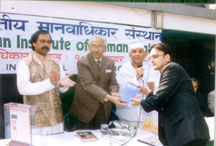
Today is the Human Rights Day and I am glad to note that the Indian Institute of Human Rights is being established on this auspicious occasion. All members of the human family must be treated as equal - equality being a human right. Human Rights are all those characteristics or attributes that are essential to life with dignity. The violation of human rights occurs when any act, or omission to act, results in a conseqence that is inconsistent with the dignity of the individual. Human Rights are natural rights which are non negotiable and do not depend on conferment by any authority. They are inherent in human existence. Enacting law is not enough unless there is a change in the thinking process of society as a whole. The remedy lies in education within the family, from the earliest stage of life and throughout society. The acknowledged index of civilisation for each country is its track record of respect for human rights in the country. There is an urgent need to rededicate to the upliftment of the common man and for developing a human rights culture in every sphere of life and in the instruments of governance. The main objective of the Institute should be to make the Protection of Human Rights Act as effective as possible by reading into it the intent behind the legislation and interpreting that to its fullest extent. The National Human Rights Commission is a complement to the institutions of the judiciary. The increase in the number of comlaints received by NHRC is indicative of the increasing violations of human rights in society. The greatest need is to increase awareness about human rights because every aware individual ceases to be a potential violator and instead becomes a potential protector. I have great pleasure in extending my best wishes for the success of the programmes of the Indian Institute of Human Rights, New Delhi. |



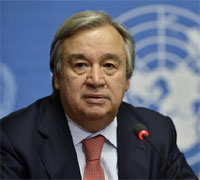
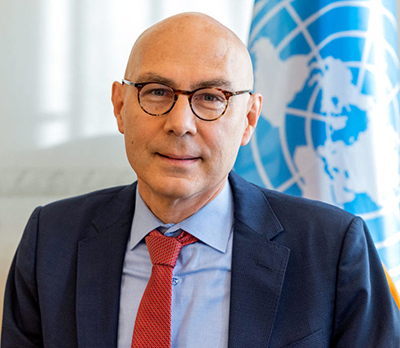
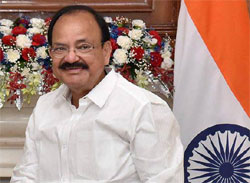 I am happy to be with all of you this evening for celebrating the Human Rights Day. Human rights are rights inherent to all human beings without discrimination. Human Rights Day, observed on 10 December every year commemorates the day on which, in 1948, the United Nations General Assembly adopted the Universal Declaration of Human Rights (UDHR). This has been a guiding document to guarantee the rights of every individual without discrimination and one that would serve as a valuable ally to the UN Charter in ensuring global peace and security.
I am happy to be with all of you this evening for celebrating the Human Rights Day. Human rights are rights inherent to all human beings without discrimination. Human Rights Day, observed on 10 December every year commemorates the day on which, in 1948, the United Nations General Assembly adopted the Universal Declaration of Human Rights (UDHR). This has been a guiding document to guarantee the rights of every individual without discrimination and one that would serve as a valuable ally to the UN Charter in ensuring global peace and security.